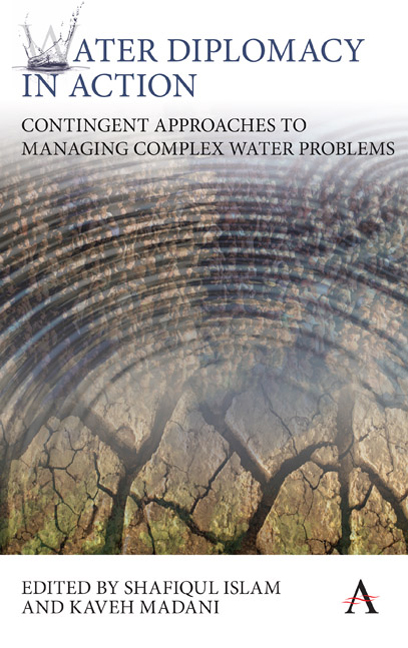Book contents
- Frontmatter
- Contents
- List of Figures
- List of Tables
- The Blind Men, the Elephant and the Well: A Parable for Complexity and Contingency
- Preface
- Part I ROOTS AND CAUSES OF COMPLEXITY AND CONTINGENCY IN WATER PROBLEMS
- Part II TOOLS, TECHNIQUES, MODELS AND ANALYSES TO RESOLVE COMPLEX WATER PROBLEMS
- Part III CASE STUDIES
- Chapter Ten The Nature of Enabling Conditions of Transboundary Water Management: Learning from the Negotiation of the Indus and Jordan Basin Treaties
- Chapter Eleven Mediation in the Israeli– Palestinian Water Conflict: A Practitioner's View
- Chapter Twelve Risk Distribution and the Adoption of Flexibility: Desalination Expansion in Qatar
- Chapter Thirteen The Grand Ethiopian Renaissance Dam: Conflict and Water Diplomacy in the Nile Basin
- Chapter Fourteen Engaging Stakeholders for Water Diplomacy: Lessons for Integrated Water Resources Management
- Chapter Fifteen Strategic Insights for California's Delta Conflict
- Notes on Contributors
- Index
Chapter Eleven - Mediation in the Israeli– Palestinian Water Conflict: A Practitioner's View
from Part III - CASE STUDIES
Published online by Cambridge University Press: 10 January 2018
- Frontmatter
- Contents
- List of Figures
- List of Tables
- The Blind Men, the Elephant and the Well: A Parable for Complexity and Contingency
- Preface
- Part I ROOTS AND CAUSES OF COMPLEXITY AND CONTINGENCY IN WATER PROBLEMS
- Part II TOOLS, TECHNIQUES, MODELS AND ANALYSES TO RESOLVE COMPLEX WATER PROBLEMS
- Part III CASE STUDIES
- Chapter Ten The Nature of Enabling Conditions of Transboundary Water Management: Learning from the Negotiation of the Indus and Jordan Basin Treaties
- Chapter Eleven Mediation in the Israeli– Palestinian Water Conflict: A Practitioner's View
- Chapter Twelve Risk Distribution and the Adoption of Flexibility: Desalination Expansion in Qatar
- Chapter Thirteen The Grand Ethiopian Renaissance Dam: Conflict and Water Diplomacy in the Nile Basin
- Chapter Fourteen Engaging Stakeholders for Water Diplomacy: Lessons for Integrated Water Resources Management
- Chapter Fifteen Strategic Insights for California's Delta Conflict
- Notes on Contributors
- Index
Summary
Abstract
Water, food, and energy challenges— study after study makes clear— are among the most significant contributors to violent domestic and international conflict in the world today. Access to clean and sufficient water is critical, not only for human health, the environment and economic development, but also for establishing stability and sustaining peace. Since 1991 in the Middle East Peace Process, water has been one of six key issues discussed, along with the borders between Israel and Palestine, refugees, illegal settlements, Jerusalem and security demands. The myriad dimensions of the conflict are heightened by inequality in access to water. To resolve the conflict— any conflict— negotiation, mediation and conciliation are needed. To be successful, though, such processes must be rooted in in- depth contextual understanding. This chapter analyzes two case studies in the Israeli– Palestinian water conflict, focusing on how to use interventions to build trust among stakeholders and how to determine whether policy learning has occurred and, if so, whether it has had any effect. The author of this chapter was involved in both case studies as a third- party mediator/ facilitator. The chapter finds that third- party and multitrack diplomacy are critical to maintaining dialogue under uncertain political conditions, particularly when formal negotiations have come to a halt, as they have between Israel and the Palestinian Authority. Especially in these times, it is important that a peaceful diplomatic solution to vital contested issues is still possible.
Introduction
Water- related conflicts and the need to resolve them are included on political agendas worldwide. Numerous studies make it clear that water, food and energy challenges are primary contributors to international and domestic conflict (Brock 2011; Gleick et al. 2014). The necessity of putting water diplomacy within the appropriate policy framework has thus become more apparent to politicians.
Water disputes rarely take place in isolation, however, and are typically part of an already- complex and likely violent conflict— such as that between Israel and Palestine. Could water become the way to peace, trust and cooperation? Cooperation on water by the Israelis and Palestinians is a golden opportunity. Finding a different modality of negotiation first, however, is essential. Until then, parties will continue the zero- sum game, sticking to their existing rights and principles rather than searching for mutual gains.
- Type
- Chapter
- Information
- Water Diplomacy in ActionContingent Approaches to Managing Complex Water Problems, pp. 203 - 228Publisher: Anthem PressPrint publication year: 2017



